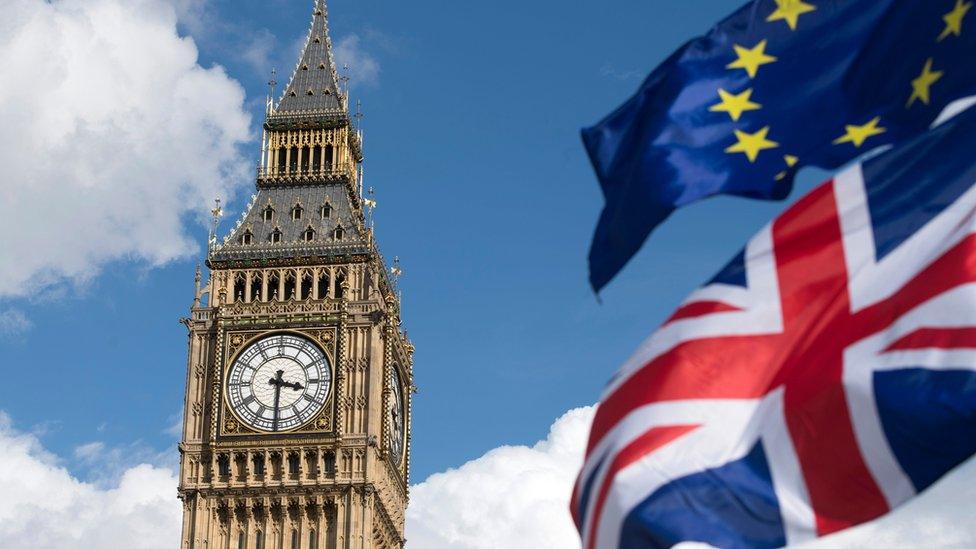Brexit: MPs urged not to 'frustrate' repeal bill
- Published
- comments

Any MPs who oppose the government's EU repeal bill will be backing a "chaotic" Brexit, ministers have warned ahead of the first key vote on the legislation.
The EU Withdrawal Bill, which will end the supremacy of EU law in the UK, is being debated in the Commons.
Foreign Secretary Boris Johnson urged MPs not to "frustrate" the process, suggesting the public wanted the government to "get this thing done".
Jeremy Corbyn is facing a rebellion over Labour's opposition to the bill.
As two former ministers said they would defy the Labour whip by not voting against the bill, Mr Corbyn said he respected the outcome of last year's Leave vote but said he could not back the measure as he believed the government was trying to evade parliamentary scrutiny and "grab" wide-ranging powers.
The Liberal Democrats also plan to vote against the bill but the government has the support of the Democratic Unionist Party, with whom they have a deal to secure a Commons majority.
Debate on the bill at second reading - the first chance for MPs to debate its main principles - resumed at 15:30 BST, with a series of votes scheduled for late on Monday night.
MPs took turns to make their case, with supporters of the legislation saying it would make the Palace of Westminster "more sovereign and more accountable" but critics claiming it sought to "strip Parliament of its sovereign power".
'Smooth transition'
Previously referred to as the Great Repeal Bill, the bill overturns the 1972 European Communities Act which took the UK into the then European Economic Community.
It will also convert all existing EU laws into UK law, to ensure there are no gaps in legislation on Brexit day.
The foreign secretary won't be drawn on length of Brexit transition period on the Today programme
Ministers say this process will ensure a smooth transition out of the EU, avoiding a "cliff-edge of uncertainty" but critics say ministers are also handing themselves sweeping powers to change laws without full parliamentary scrutiny.
Former Conservative Chancellor Ken Clarke predicted the government would have to change the wording of the bill to deal with concerns about what he said was an unprecedented use of delegated powers.
Conservative Bob Neill said some of the proposals in terms of powers were "unacceptable and unnecessary" but blocking the bill would "do nothing for the good governance of the country nor for business confidence".

A taste of things to come
BBC political editor Laura Kuenssberg
Ministers accept privately that they will probably have to budge in some areas. But tonight's midnight vote is not likely to be the big showdown.
Tory rebels will, in the main, vote for the bill in principle, and enter hand-to-hand combat in the more detailed stages in the next couple of months. And although the opposition will vote against the bill this evening, there are also anxious MPs on that side of the House of Commons who won't, worried about appearing to be blocking Brexit by "killing the bill".
But tonight will be the first real taste of the months to come, the House of Commons sitting until midnight, the government anxiously totting up the numbers, MPs being told to cancel any plans they have to be around for vital votes.

Labour, which says the bill will give the government powers similar to those used by medieval monarchs, has tabled a series of amendments and will order its MPs to oppose it at second reading stage unless its changes are accepted.
"I hope Labour MPs will recognise that Labour fought the election recognising the result of the referendum... and that we would seek parliamentary scrutiny of the whole negotiating process," Mr Corbyn told BBC Radio 4's World at One.
Labour MP Caroline Flint tells Radio 4's Today she will abstain from voting against the Withdrawal Bill
"It does not mean handing over all our decision-making on how the negotiations proceed to one secretary of state. This is a power grab by the government at the expense of our democratically elected Parliament."
But Labour MP Caroline Flint, a former minister for Europe, is refusing to vote against the bill despite the three-line whip imposed by her party - the strongest available sanction.
"Our job is to improve this bill," she told BBC Radio 4's Today programme. "Not kill it at birth."
Ms Flint, who has yet to defy the whip, said voting the bill down would cause "huge problems" by ending the session of Parliament and requiring an entirely new bill.
Also confirming that he would not vote against the bill, Labour's former welfare minister Frank Field said he was "on the side of the majority of people who voted to come out" of the EU.
'Great ship'
The SNP said there was a risk of currently devolved powers being returned to Westminster in areas such as fishing and farming but Foreign Secretary Boris Johnson said passing the bill was an important step in "honouring the promises" the government had made regarding Brexit.
"We need to get this great ship launched," he told BBC Radio 4's Today.
"I do very much hope we will win tonight but people who vote against it will be effectively voting to frustrate Brexit by producing a completely chaotic result."
And Brexit Secretary David Davis said the measures in the bill would mean the UK could leave the EU "safe in the knowledge that we are ready for day one of exit".
"A vote against this bill is a vote for a chaotic exit from the European Union," he warned. "The British people did not vote for confusion and neither should Parliament. Without it, we would be approaching a cliff edge of uncertainty which is not in the interest of anyone."